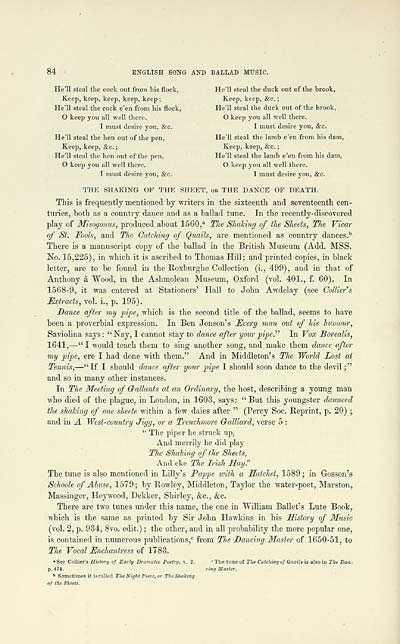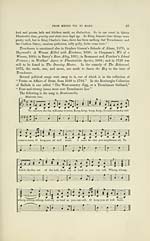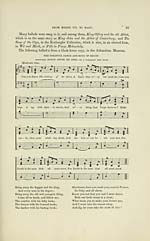Glen Collection of printed music > Printed text > Popular music of the olden time > Volume 1
(118) Page 84 - Shaking of the sheet, or The dance of death
Download files
Complete book:
Individual page:
Thumbnail gallery: Grid view | List view

84 ENGfLISH SONG AND BALLAD MUSIC.
He'll steal the cock out from his flock, He'll steal the duck out of the brook,
Keep, keep, keep, keep, keep ; Keep, keep, &c. ;
He'll steal the cock e'en from his flock, He'll steal the duck out of the brook,
O keep you all well there. O keep you all well there.
I must desire you, &c. I must desire you, &c.
He'll steal the hen out of the pen. He'll steal the lamb e'en from his dam,
Keep, keep, &c. ; Keep, keep, &c. ;
He'll steal the hen out of the pen. He'll steal the lamb e'en from his dam,
O keep you all well there. O keep you all well there.
I must desire you, &c. I must desire you, &c.
THE SHAKING OF THE SHEET, ob THE DANCE OF DEATH.
This is frequently mentioned by writers in tlie sixteenth and seventeenth cen-
turies, both as a country dance and as a ballad tune. In the recently- discovered
play of Misogonus, produced about 1560," The Shaking of the Sheets, TJie Vicar
of St. Fools, and The Catching of Quails, are mentioned as country dances.'^
There is a manuscript copy of the ballad in the British Museum (Add. MSS.
No. 15,225), in which it is ascribed to Thomas Hill; and printed copies, in black
letter, are to be found in the Roxburghe Collection (i., 499), and in that of
Anthony ^ Wood, in the Ashmolean Museum, Oxford (vol. 401., f. 60). In
1568-9, it was entered at Stationers' Hall to John Awdelay (see Collier's
Extracts, vol. i., p. 195).
Dance after my pipe, which is the second title of the ballad, seems to have
been a proverbial expression. In Ben Jonson's Every man out of his humour,
Saviolina says: "Nay, I cannot stay to dance after your pipe.'''' In Yox Borealis,
1641, — "I would teach them to sing another song, and make them dance after
my pipe, ere I had done with them." And in Middleton's The "World Lost at
Tennis, — "If I should dance after your j)ipe I should soon dance to the devil;"
and so in many other instances.
In The Meeting of Q-allants at an Ordinary, the host, describing a young man
who died of the plague, in London, in 1603, says: "But this youngster daunced
the shahing of one sheete within a few dales after " (Percy Soc. Reprint, p. 20) ;
and in A West-country Jigg, or a Trenchnore Galliard, verse 5 :
" The piper he struck up.
And merrily he did play
TJie Shahing of the Sheets,
And eke The Irish Hay."
The tune is also mentioned in Lilly's Pappe with a Hatchet, 1589 ; in Gosson's
Schoole of Abuse, 1579; by Rowley, Middleton, Taylor the water-poet, Marston,
Massmger, Heywood, Dekker, Shirley, &c., &c.
There are two tunes under this name, the one in William Ballet's Lute Book,
which is the same as printed by Sir John Hawkins in his History of Music
(vol. 2, p. 934, 8vo. edit.) ; the other, and in all probability the more popular one,
is contained in numerous publications,'^ from Tlie Dancing Master of 1650-51, to
The Voccd Enchantress of 1783.
• See Collier's History of Early Dramatic Poetry, v. 2, *= The tune of The Catchifig of Quails is also in The Ban-
p. 474. cing Master.
*» Sometimes it J8 called The Night Piece, or The Shaking
of the Sheets.
He'll steal the cock out from his flock, He'll steal the duck out of the brook,
Keep, keep, keep, keep, keep ; Keep, keep, &c. ;
He'll steal the cock e'en from his flock, He'll steal the duck out of the brook,
O keep you all well there. O keep you all well there.
I must desire you, &c. I must desire you, &c.
He'll steal the hen out of the pen. He'll steal the lamb e'en from his dam,
Keep, keep, &c. ; Keep, keep, &c. ;
He'll steal the hen out of the pen. He'll steal the lamb e'en from his dam,
O keep you all well there. O keep you all well there.
I must desire you, &c. I must desire you, &c.
THE SHAKING OF THE SHEET, ob THE DANCE OF DEATH.
This is frequently mentioned by writers in tlie sixteenth and seventeenth cen-
turies, both as a country dance and as a ballad tune. In the recently- discovered
play of Misogonus, produced about 1560," The Shaking of the Sheets, TJie Vicar
of St. Fools, and The Catching of Quails, are mentioned as country dances.'^
There is a manuscript copy of the ballad in the British Museum (Add. MSS.
No. 15,225), in which it is ascribed to Thomas Hill; and printed copies, in black
letter, are to be found in the Roxburghe Collection (i., 499), and in that of
Anthony ^ Wood, in the Ashmolean Museum, Oxford (vol. 401., f. 60). In
1568-9, it was entered at Stationers' Hall to John Awdelay (see Collier's
Extracts, vol. i., p. 195).
Dance after my pipe, which is the second title of the ballad, seems to have
been a proverbial expression. In Ben Jonson's Every man out of his humour,
Saviolina says: "Nay, I cannot stay to dance after your pipe.'''' In Yox Borealis,
1641, — "I would teach them to sing another song, and make them dance after
my pipe, ere I had done with them." And in Middleton's The "World Lost at
Tennis, — "If I should dance after your j)ipe I should soon dance to the devil;"
and so in many other instances.
In The Meeting of Q-allants at an Ordinary, the host, describing a young man
who died of the plague, in London, in 1603, says: "But this youngster daunced
the shahing of one sheete within a few dales after " (Percy Soc. Reprint, p. 20) ;
and in A West-country Jigg, or a Trenchnore Galliard, verse 5 :
" The piper he struck up.
And merrily he did play
TJie Shahing of the Sheets,
And eke The Irish Hay."
The tune is also mentioned in Lilly's Pappe with a Hatchet, 1589 ; in Gosson's
Schoole of Abuse, 1579; by Rowley, Middleton, Taylor the water-poet, Marston,
Massmger, Heywood, Dekker, Shirley, &c., &c.
There are two tunes under this name, the one in William Ballet's Lute Book,
which is the same as printed by Sir John Hawkins in his History of Music
(vol. 2, p. 934, 8vo. edit.) ; the other, and in all probability the more popular one,
is contained in numerous publications,'^ from Tlie Dancing Master of 1650-51, to
The Voccd Enchantress of 1783.
• See Collier's History of Early Dramatic Poetry, v. 2, *= The tune of The Catchifig of Quails is also in The Ban-
p. 474. cing Master.
*» Sometimes it J8 called The Night Piece, or The Shaking
of the Sheets.
Set display mode to: Large image | Transcription
Images and transcriptions on this page, including medium image downloads, may be used under the Creative Commons Attribution 4.0 International Licence unless otherwise stated. ![]()
| Special collections of printed music > Glen Collection of printed music > Printed text > Popular music of the olden time > Volume 1 > (118) Page 84 - Shaking of the sheet, or The dance of death |
|---|
| Permanent URL | https://digital.nls.uk/91368863 |
|---|
| Shelfmark | Glen.254 |
|---|---|
| Additional NLS resources: | |
| Attribution and copyright: |
|
| Description | Scottish songs and music of the 18th and early 19th centuries, including music for the Highland bagpipe. These are selected items from the collection of John Glen (1833 to 1904). Also includes a few manuscripts, some treatises, and other books on the subject. |
|---|
| Description | The Glen Collection and the Inglis Collection represent mainly 18th and 19th century Scottish music, including Scottish songs. The collections of Berlioz and Verdi collected by bibliographer Cecil Hopkinson contain contemporary and later editions of the works of the two composers Berlioz and Verdi. |
|---|

